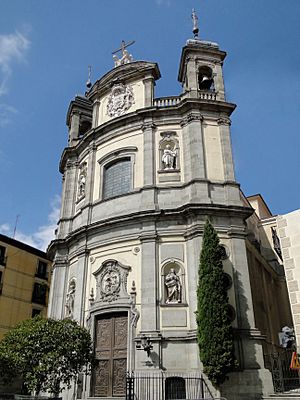Basílica pontificia de San Miguel facts for kids
Quick facts for kids Pontifical Basilica of St. Michael |
|
|---|---|
|
Basílica Pontificia de San Miguel
|
|

Façade of the basilica
|
|
| 40°24′51.46″N 3°42′34.73″W / 40.4142944°N 3.7096472°W | |
| Location | Madrid |
| Country | Spain |
| Denomination | Catholic Church |
| History | |
| Status | Pontifical minor basilica |
| Dedication | Saint Michael |
| Architecture | |
| Functional status | Active |
| Heritage designation | Bien de Interés Cultural |
| Architect(s) | Santiago Bonavía |
| Architectural type | Church architecture |
| Style | Baroque |
| Groundbreaking | 1739 |
| Completed | 1745 |
| Construction cost | 1,421,000 reales |
| Specifications | |
| Length | 50 metres (160 ft) |
| Width | 27 metres (89 ft) |
| Nave width | 14 metres (46 ft) |
| Administration | |
| Archdiocese | Madrid |
| St. Michael's Basilica | |
|---|---|
| Native name Spanish: Basílica de San Miguel |
|
| Lua error in Module:Location_map at line 420: attempt to index field 'wikibase' (a nil value). | |
| Location | Madrid, Spain |
| Official name: Basílica de San Miguel | |
| Type | Non-movable |
| Criteria | Monument |
| Designated | 1985 |
| Reference no. | RI-51-0005004 |
The Pontifical Basilica of St. Michael (Spanish: Basílica Pontificia de San Miguel) is a beautiful Baroque-style Catholic church. It is also a minor basilica located in the heart of Madrid, Spain. You can find it on San Justo Street, right next to the Archbishop's Palace. This church serves as the official church for the Apostolic Nunciature to the Kingdom of Spain, which represents the Holy See (the Pope's main office). Today, priests from a group called Opus Dei manage the basilica.
Contents
History of the Basilica
Building the Church
Construction of the basilica started in 1739. It was built on the same spot where an older church, dedicated to Saints Justus and Pastor, once stood. A very important church leader, Cardinal Infante Luis of Chinchón, who was the Archbishop of Toledo, ordered the work. He also paid for it, spending 1,421,000 reales, which was a lot of money back then! The building was finished in 1745.
Changes Over Time
After the Napoleonic invasion (when Napoleon's armies came to Spain), the church was also dedicated to Saint Michael (San Miguel). This happened because a nearby church, San Miguel de los Octoes, was torn down.
Who Designed It?
The main ideas for the church's design are thought to have come from Santiago Bonavía. Another architect, Teodoro Ardemans, might have helped earlier on. The building was completed by Vigilio Rabaglio.
On the front of the church, you can see amazing statues. Roberto Michel and Nicolás Caresana sculpted figures representing important virtues like charity, faith, hope, and fortitude (courage). There's also a special stone panel by Caresana that shows the martyrdom (death for their beliefs) of Saints Justo and Pastor. Inside, the dome is decorated with colorful paintings from 1745 by Bartolomé Rusca. These paintings show the saints being honored in heaven.
Inside the Basilica
Art and Sculptures
The interior of the basilica holds several beautiful wooden sculptures. One famous piece is called "Cristo de la Fe y del Perdón" (Christ of Faith and Forgiveness). It was created by the artist Luis Salvador Carmona.
Famous Burials
Luigi Boccherini's Resting Place
The famous Italian composer Luigi Boccherini lived and died in Madrid. He was buried in this basilica until 1927. At that time, Benito Mussolini arranged for his remains to be moved back to his hometown of Lucca, Italy. Boccherini was then reburied in the Church of San Francesco.
Gallery
See also
 In Spanish: Basílica pontificia de San Miguel para niños
In Spanish: Basílica pontificia de San Miguel para niños
- Catholic Church in Spain
- List of oldest church buildings
 | Ernest Everett Just |
 | Mary Jackson |
 | Emmett Chappelle |
 | Marie Maynard Daly |



